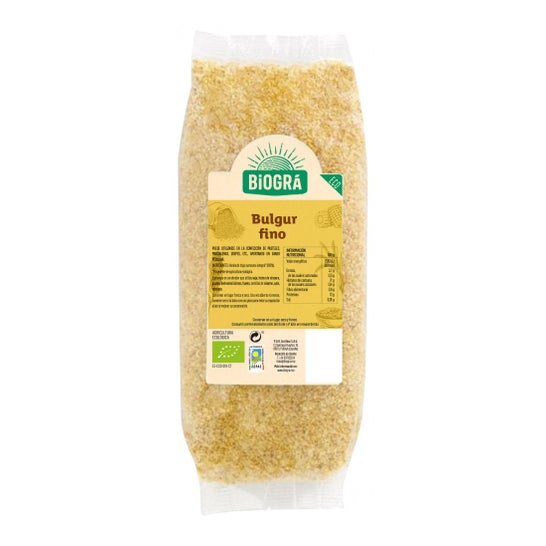Bulgur or bulgur wheat is one of the most popular foods in the Middle East since ancient times. Biográ has recovered its artisan process to produce a high quality wheat semolina by processing grains from organic crops. The result is a product that can be used in any type of rice, soups, stir-fries or salads. It can even be used as a meat substitute in hamburgers.
No harmful substances are used in the manufacturing process, making it ideal for the whole family. In addition, bulgur contains fiber, carbohydrates, high quality protein, vitamin A and minerals such as iron and magnesium. It is not suitable for people with celiac disease due to the presence of gluten or sensitive to hard nuts, dairy, eggs or sesame seeds or soybeans.
Biogra Bulgur Wheat Bulgur Bio Fine 500g
Log into your account and set up an alert to be notified when the product becomes available again.
Do you want us to notify you when it is available?
Description
Instructions for use
Use one measure of bulgur to two measures of water, salt and boil for 15 minutes.
Composition
100% wheat semolina
Pharmaceutical Advice
Iron is a functional mineral that contributes to the body's growth and development. It is present in haemoglobin and myoglobin. These proteins transport oxygen from the lungs to the rest of the organism. Iron is also involved in the creation of hormones and connective tissue.
Our organism absorbs this mineral from foods such as seafood, lean meat, eggs, pulses and nuts. To facilitate its absorption, it is advisable to add acidic foods rich in vitamin C, such as orange or lemon juice, to the diet. A lack of iron in the diet can cause iron deficiency (anaemia). In the long term, it can lead to symptoms such as a constant lack of energy, fatigue, intestinal disorders and/or difficulty keeping body temperature under control. Lack of iron can be restored through a varied diet. If this is not enough, it can be mitigated through supervised supplementation. It is essential to follow the advice of a healthcare professional and always avoid taking an iron dietary supplement without checking if you are deficient in this mineral.
The body's iron requirements will change throughout the years. It is particularly important to regulate it during the years of menstruation, as well as in pregnant women and infants. Iron is also actively involved in development and growth and is therefore very important for newborn babies.
Safety and product information
Safety visual aids
At this time we do not have safety images for this product, but we are working on it. We encourage you to check back later for updates. In the meantime, we recommend that you read the safety information that comes with the product before using it. If you have any questions about safety, please do not hesitate to contact us. Also, if you wish, you can also return the product by following our terms and conditions.
Manufacturer details
At the moment we do not have the manufacturer's details, but we are working to add them as soon as possible. We invite you to check back later for updates. If you have any questions, please do not hesitate to contact us, we will be happy to help you.
RELATED SEARCHES ABOUT Food
New in Nutrition
- Health4U Aceite Onagra Special Edition 60caps
- Granions Minceur & Beauté Proteínas Vegetales + Colágeno 275 g
- Pranarôm Aromaforce Ola de Frío 9x2 g
- Nat&Form Cromo 200µg 60 Perlas
- Marnys Pack Spray Propóleo + Propolsaft Plus 12 Sticks
- Granions Hydrop Collagen Frambuesa Casis 18comp
- Mium Lab Gummies Sueño 42uds
- Granions Spray Sueño Flash Melatonina 1,9mg 25 ml
- 226Ers Energy Shot Stick Xtrem 250mg Cafeína Banana 60 ml
- Corny 30 % Protein Crunchy Vainilla 45 g

